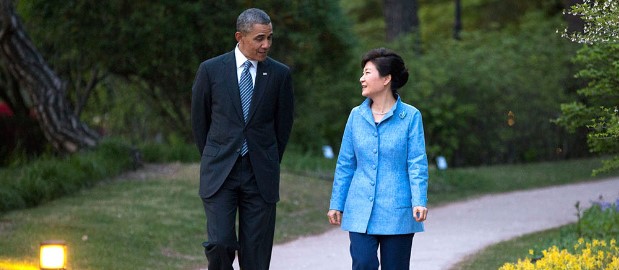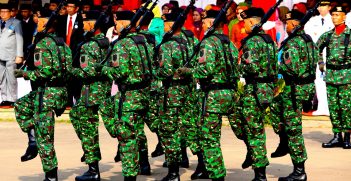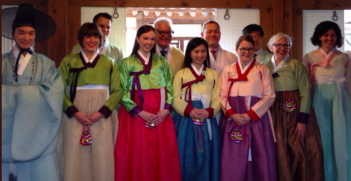How Weaker Allies Get Their Way

While power matters in alliance relations, the weaker state holds a leveraging opportunity to frame issues to its advantage. This could be done by influencing public opinion via media attention in ways that affect alliance dynamics.
Asymmetry is a major feature of all alliances. In particular, power asymmetry is central to security relationships between allies. However, there are also instances where weaker states can significantly influence alliance dynamics. Our study has shown that the relative attention that each side pays to the alliance, or a disparity in attention, can be crucial. Since the alliance is more central to the weaker client state’s agendas, it pays more attention to the alliance. This asymmetry of attention offers leveraging opportunities for the weaker (client) ally.
This is because attention, especially media attention in a democratic country, can influence public opinion in ways that affect alliance dynamics. The weaker state not only pays more attention to the alliance, but can also frame and reframe alliance issues to a major degree, reversing the client–patron roles. That is, the amount and intensity of media attention within the weaker state can provoke a public reaction, which in turn can increase its leverage vis-à-vis its stronger, patron ally.
In the case of the US–South Korea (ROK) alliance, South Korea has more at stake in the relationship, and thus pays more attention to alliance-related issues. For the United States, South Korea is only one of many countries, whereas for Korea, the US is central to its foreign policy agenda and domestic political debates. Therefore, alliance issues are more important for South Korea than they are for the US and debates about them tend to become more intense than in the US. The ROK can thus use media attention in its favour as a leverage point.
The difference in the amount and intensity of South Korean news about the US, and vice versa, is stark. From 1993 to 2003, according to our study, Korean newspapers published on average about 1.6 times as many articles on the USA as US newspapers did on Korea. Korean newspapers published four times as many articles about US–ROK relations than US newspapers. Even more striking are the different levels of intensity of media attention, measured in the form of editorials and opinion columns. These pieces offer evaluative or analytical statements beyond descriptive or factual ones, suggesting how things should or should not be done, often provoking public debate. South Korean newspapers on average published 56 times the number of editorials and opinion columns on US–ROK relations than US newspapers. Thus, while the US–ROK relationship became a major subject of media attention and public debate in Korea, it received little attention and only descriptive coverage at best, in the US media. All in all, Korea pays significantly more media attention to the alliance, in both amount and intensity, than the US.
For example, during a US military training operation on a base just outside of Seoul in June 2002, an army tank accidentally struck and killed two Korean junior high school students. The story provoked a large amount of coverage and attention in the South Korean media. For many South Koreans, this was a clear indication of their nation’s unequal relationship with the US. Demanding an official apology for the deaths and subsequent controversial verdicts, stories on the topic grew in both number and intensity, morphing into a debate about the US–ROK alliance, especially US troops’ presence in the Korean Peninsula.
In stark contrast, the US media paid little if almost no attention to the incident. For example, the major Korean daily Chosun Ilbo featured as many as 247 stories, including 16 opinion pieces, on the incident. In contrast, only two stories appeared in the Washington Post and none at all appeared in the Wall Street Journal. During the brunt of the media coverage and public protests in Korea, the US foreign policy agenda was wholly dedicated to its War on Terror and surge in Iraq. As public debates and protests grew and the situation became increasingly unstable in Korea, President Bush issued a formal apology. It was the first time a US president had ever issued an apology to the Korean people.
The same role reversal took place during the US beef protests in 2008. When the conservative Lee Myung Bak government took office, opponents feared the beef issue could lead to a free trade agreement between the US and South Korea, the third-largest international purchaser of US beef. South Koreans were already sensitive about cases of mad cow disease, so when Lee opened the Korean market to US beef imports, it provoked angry reactions from the public.
This issue dominated the South Korean media, but garnered limited media attention in the US. Beef imports provoked intense debate between progressive and conservative media figures in South Korea through editorials and op-eds, but almost none appeared in the US media. As the situation became increasingly volatile, the Korean government suspended and renegotiated its already concluded deal with the US – an act that would have been very difficult without a US concession. Under pressure from popular protests and increasing anti-American sentiments, the US was compelled to agree to the new deal.
In both cases, extensive media attention in South Korea provoked public reaction. This led to political pressure (either directly on the patron state or indirectly through the client state) bringing about a US concession. The two cases occurred in different political contexts (progressive versus conservative administrations) on issues of varying relevance to the alliance (directly or indirectly related), but still led to the same outcome. In both cases, the amount and intensity of attention paid to the alliance facilitated the weaker states’ ability to get their way.
In short, while power matters in alliance relations, as the weaker ally develops economically and politically, these relations are subject to change. In particular, in developing democracies and other countries with asymmetrical alliances, relative media attention can play a decisive role. Thus, future studies of alliance politics should take the role of relative attention more seriously.
Gi-Wook Shin is the director of the Walter H Shorenstein Asia-Pacific Research Center at Stanford University, US. Rennie J Moon is an assistant professor at the Underwood International College at Yonsei University, South Korea. Hilary Izatt is a lecturer in political science at SUNY Cortland, New York. This article is adapted from the longer version that appeared in the Australian Journal of International Affairs.





